

Exam cheat jailed for hacking into university computer system. "This kind of conduct undermines or has the potential to undermine public confidence in the degree system, set up by this university.
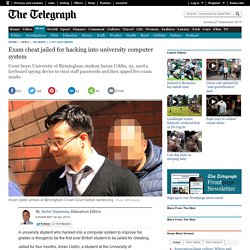
I have decided I cannot pass a suspended sentence because there needs to be an element of deterrence. " • Hackers 'could hijack new signalling system and crash trains' Mr Uddin, who is married, attached a "shadowing" keyboard device at the back of a number of university computers in order to steal staff passwords, the court heard. Hacking into computer systems - a beginners guide.
Hacking Questions at Times of London. LONDON — Questions about illegal computer hacking by The Times of London were raised on Thursday when officials at the judicial inquiry into press ethics said they would recall the paper’s editor for further testimony and the police confirmed that they were investigating an incident in 2009 in which one of the paper’s reporters apparently hacked an e-mail account.

So far the bulk of the police investigation has focused on phone hacking, which officials at ’s News International have admitted was rampant at the now-defunct News of the World tabloid. COMPUTER CRIME. What is Computer Crime???
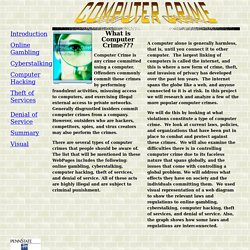
Computer Crime is any crime committed using a computer. Offenders commonly commit these crimes by performing fraudulent activities, misusing access to computers, and exercising illegal external access to private networks. Generally disgruntled insiders commit computer crimes from a company. However, outsiders who are hackers, competitors, spies, and virus creators may also perform the crimes.
Unauthorized access. Unauthorized Access is a documentary produced by Annaliza Savage in 1994.
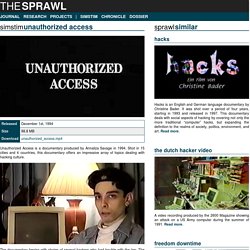
Shot in 15 cities and 4 countries, this documentary offers an impressive array of topics dealing with hacking culture. The documentary begins with stories of several hackers who had trouble with the law. The first interview is with Mark Abene, aka Phiber Optik, who was just sentenced to a year of imprisonment for unauthorized access to federal interest computers among other charges. Mark describes the indictment as pathetic. Hacking, Tech And News.
Hacking vs unauthorised access – what’s the difference? As cyber crime becomes more commonplace, it’s vital that the media understands the difference between hacking and unauthorised access.
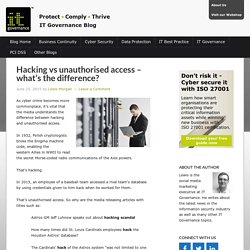
In 1932, Polish cryptologists broke the Enigma machine code, enabling the western Allies in WWII to read the secret Morse-coded radio communications of the Axis powers. That’s hacking. Defending your rights in the digital world. GetCyberSafe - Home. NetSafe: Cybersafety and Security advice for New Zealand. NetSafe is an independent non-profit organisation.
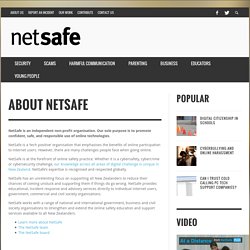
Our sole purpose is to promote confident, safe, and responsible use of online technologies. NetSafe is a ‘tech positive’ organisation that emphasises the benefits of online participation to internet users. Computer Hacking and Ethics. Brian HarveyUniversity of California, Berkeley [A slightly different version of this paper was written for the ``Panel on Hacking'' held by the Association for Computing Machinery in April, 1985.
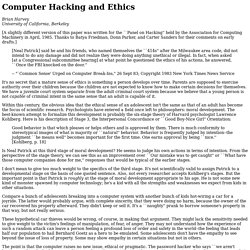
Thanks to Batya Friedman, Donn Parker, and Carter Sanders for their comments on early drafts.] [Neal Patrick] said he and his friends, who named themselves the ``414s'' after the Milwaukee area code, did not intend to do any damage and did not realize they were doing anything unethical or illegal. “Cyber-crime Jurisdiction in New Zealand. As identity theft) were occurring, or a lack of appreciation that computer-basedcrimes were distinct from crimes committed through traditional means (if indeed they are), or quantitatively or qualitatively significant.Article 2 of the 2001 Council of Europe’s Convention on Cybercrime required signatory governments to enact such provisions as may be necessary toestablish as criminal offences under their domestic laws, when committedintentionally, the access to the whole or any part of a computer system withoutright.
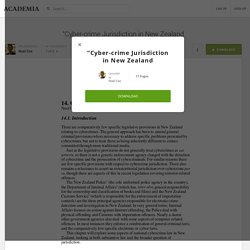
Although New Zealand was not a signatory to this Council of Europeinitiative, the Budapest convention is the first international agreement on thecontrol of cybercrime; it has so far been signed by 42 countries, and itsinfluence could not be ignored. 14.2.2. Provisions on Various Cybercrimes. NZLC - Report 54: Computer Misuse - Appendix A: Legislation. You are here: NZLII >> Databases >> New Zealand Law Commission >> Report >> R54 >> Appendix A [Database Search] [Name Search] [Previous] [Next] [Download] [Help] Legislation Summary: 96 Appendix A is in two parts.
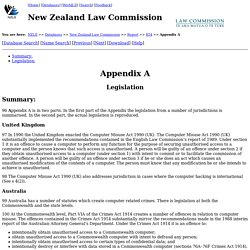
Chapter 11. Criminal Law and The Internet by Mark D. Rasch. This is one of eleven chapters contained in The Internet and Business: A Lawyer's Guide to the Emerging Legal Issues, published by the Computer Law Association.
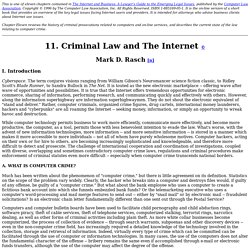
Copyright © 1996 by The Computer Law Association, Inc. All Rights Reserved. Privacyinternational. Today, Privacy International lodged a legal challenge to GCHQ's extensive and intrusive hacking of personal computers and devices. Below, we answer a few questions about the law underlying our complaint, and why it matters.
Is hacking legal? As a result of the Snowden revelations, we have learned that GCHQ, often in partnership with the NSA, has been using malicious software to intrude upon our computers and mobile devices. THE LEGAL FRAMEWORK. No special penal legislation Federal legislation: The Cybercrime Act 2001 amended the Criminal Code Act 1995 to replace existing oudated computer offences. 478.1 Unauthorised access to, or modification of, restricted data. Computer Fraud and Abuse Act (CFAA) - Internet Law Treatise. Hacking. What are hackers? Hackers are people who try to gain unauthorised access to your computer.
This is normally done through the use of a 'backdoor' program installed on your machine. You can protect yourself from these by using a firewall and a good up-to-date anti-virus program. You would normally get such a backdoor program by opening an E-mail attachment containing the backdoor program. It is normal for such a backdoor program to send out more copies of itself to everyone in your address book, so it is possible for someone you know to unintentionally send you a malicious program. Why do hackers hack? FindLaw - Practical legal articles from FindLaw New Zealand. More Articles like this in:Criminal LawScience & TechnologyIT & the Internet New Computer CrimesAuthor: Simpson Grierson The Love Bug virus, the Code Red worm, identity theft, denial of service attacks, hacking - cyber crime is increasingly impacting on our lives.
Unfortunately, existing law is not always equipped to deal with the perpetrators of cyber crime. In its Computer Misuse report, (1999) the Law Commission concluded that existing New Zealand law was inadequate to deal with cyber crime. In response, the Government introduced a Bill to amend the Crimes Act 1961 including the creation of a number of new computer crimes. Computer hacking. Scammers will go to great lengths to hack into your computer and have some very clever means.